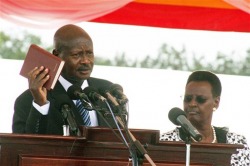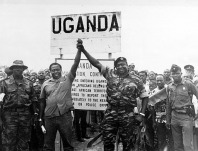Uganda: Current Status

Marley Melchiorre
World History -Hjelmgren
May 7, 2009
Period 7
Uganda: Current Status
The beautiful east African country of Uganda has suffered through brutal violence over the years, but is beginning to improve. Their economy is mostly supported by agriculture due to the abundance of fertile lands. The population of Uganda is currently 30.9 million, consisting of 99 percent African and one percent European and Asian. The official language of Uganda is English, but other languages, such as Swahili, Luganda, Bantu, and Nilotic are spoken as well. Eighty-five percent of Uganda’s population is Christian, twelve percent are Muslim, and three percent is other tribal religions. Life expectancy in Uganda is 45.3 years and the infant mortality rate is 86/1,000 (State Department Documents, 2009).
Uganda’s current leader is Yoweri Museveni, who came into power in 1986 after fighting a five year guerrilla war against Uganda’s former government of Milton Obote. Museveni brought peace after a long history of conflict and government corruption. Since Museveni’s rule, he has brought about advancements in education, human rights, and health (ABC-CLIO, 2009). The current literacy rate is 70 percent along with a school attendance record of 89 percent (State Department Documents, 2009).
The country of Uganda is a Republic, and has successfully attracted foreign aid from The World Bank and The International Monetary Fund (ABC-CLIO, 2009). Their main trading partners are South Africa, Kenya, Switzerland, and the United Kingdom. Due to Uganda’s rich soil, they produce several cash crops including coffee (main export), sugarcane, cotton, tea, tobacco, and cut flowers. Eighty percent of the population works in agriculture. Currently the Uganda tourist industry is improving. After suffering during the political instability in the 1970s and 80s, they are focusing on promoting the tropical forests. Despite economic progress and advances in human rights and AIDS prevention, Uganda is still one of the world’s poorest countries (ABC-CLIO, 2009).
Uganda has a particularly good relationship with the United States, supporting the global war against terrorism, and working to end human rights abuses. The U.S. has provided humanitarian effort in HIV/AIDS teacher training and prevention programs (ABC-CLIO, 2009). We have provided major assistance attempting to decrease poverty. Worldwide cultural exchange programs provide humanitarian assistance to places affected by drought and poor food supply (ABC-CLIO, 2009).
Uganda possesses great beauty and the potential for prosperity, despite its turbulent past. As Museveni’s rule continues, Northern Uganda is not stable due to the LRA rebels (Lord’s Resistance Army). In 2006, these rebels agreed to cease-fire, although fighting has continued to threaten the north. However, throughout the country, artistic and cultural pride is present. The U.S. Peace Core volunteers continue their HIV/AIDS teacher training programs and have successfully reduced the rate of HIV infection, which is a first in Africa (ABC-CLIO, 2009). Despite the progress that Uganda has made, economic and political challenges remain, forcing the dependence on foreign aid.
Annotated Bibliography
ABC-CLIO. (2009). Uganda: Country Overview. Retrieved April 28, 2009, from
World Geography: http://www.worldgeography.abc-clio.com
-This website helped me learn what type of cuntry Uganda is like overall, along with their leader.
ABC-CLIO. (2009). Uganda: Government. Retrieved April 28, 2009, from World
Geography: http://www.worldgeography.abc-clio.com
-This website helped me get population numbers, literacy numbers, etc.
State Department Documents. (2009, February 04). Background Notes: Uganda.
Retrieved April 29, 2009, from eLibrary: http://elibrary.bigchalk.com
-This website helped me find information on Uganda’s government type and their allies and trading partners.
State Department Documents. (2009, Februray 04). Background Notes: Uganda.
Retrieved April 29, 2009, from eLibrary: http://elibrary.bigchalk.com
-This website helped me get information on Uganda’s cash crops and Uganda’s people.
LAST UPDATED: May 22, 2009 By Marley Melchiorre

